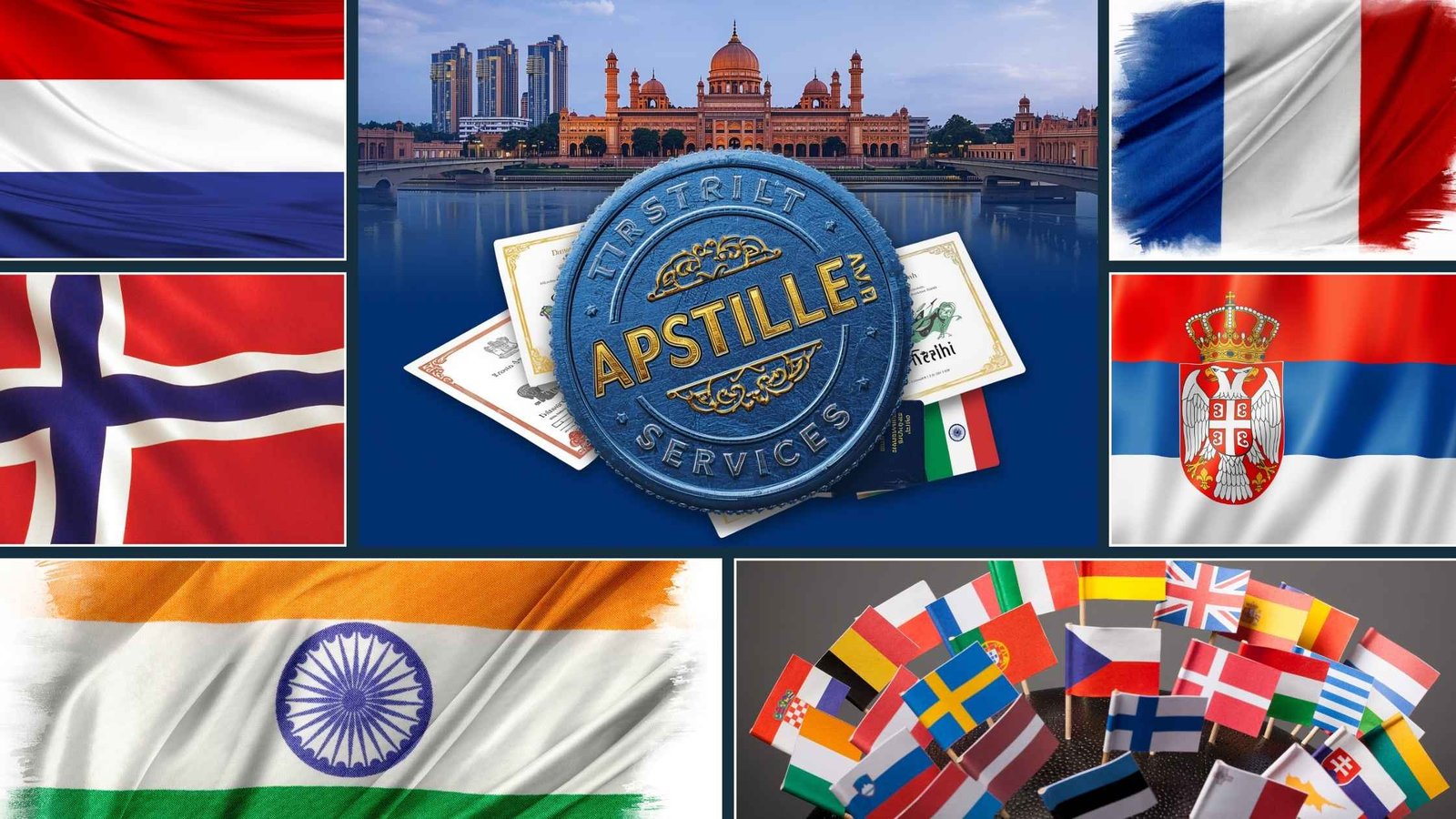Hassle-Free Apostille Services for Birth, Marriage, Educational Certificates, etc.
Who We Serve ?
Our services cater to a diverse clientele, including:
Individuals: For personal documents like birth certificates, marriage certificates, and educational qualifications required for immigration, education, or employment purposes.
Businesses: For legal and commercial documents such as contracts, agreements, and certificates of incorporation necessary for international trade and partnerships.
Students: For academic documents like transcripts and degree certificates needed for admission to universities abroad.
What We Apostille?
We provide apostille services for various categories of documents such as:
Educational Documents: Degree certificates, diplomas, mark sheets, transcripts, etc.
Personal Documents: Birth certificates, marriage certificates, divorce decrees, police clearance certificates, etc.
Commercial Documents: Agreements between businessmen, Power of Attorney, Certificates of company registration, etc.
Why choose us?
La Classe’s Apostille in India is providing the best apostille services in all the major cities. We are covering Indian cities like Ahmedabad, Bangalore, Chennai, Chandigarh, Delhi, Hyderabad, Indore, Kolkata, Mumbai, Pune, and many more.
However, the below mentioned are the reason why an individual should choose us..
Fast Processing
Our regular turn around time is 2-3 working days with express options for quicker ones.
Doorstep Pickup & Delivery
Convenient pick-up of documents and safe delivery at your preferred location.
All types of Documents
We are covering all kinds of documents i.e personal, educational and commercial documents.
Affordable Rate
We ensure that you get hassle free apostille services and that is at an affordable rate.
PAN India Coverage
We have a strong network across India to ensure smooth processing, irrespective of one's location.
Professional experience
Over 22 years of experience in document legalization and apostille processing.
If you need professional apostille services, we can help you make your international journey smooth and hassle-free! Contact us today!
OUR MAJOR SERVICES
Apostille Services
La Classe’s Apostille in India provide apostille services that are done by Ministry of External Affairs for educational certificates, business, and personal purposes to make the documents
Embassy Attestation
We provide embassy legalization for non-Hague nations to legally authenticate your documents to make them acceptable across the world.
MOFA Attestation
We provide MOFA attestation for UAE for employment, study, and residence.
Certified Translation
Get professional legalization of legal documents, educational documents & individual documents in over 100+ language pairs by professional expert authorized persons.
Notarization Services
We offer notary and legal attestation services to authenticate the originality of documents before apostille or embassy legalization.
HRD Attestation
We process attestation of educational certificates for foreign employment or study through the Human Resource Department.
Apostille Services
Apostille services allow businesses and organizations to authenticate documents for use internationally by providing legal recognition in countries that are party to the Hague Apostille Convention. For many businesses, the ability to have documents appropriately authenticated and legalized for international ventures is critical in addressing administrative hurdles in order to reduce and eradicate administrative bureaucracy.
Types Of Documents
Personal Documents
Personal Documents Used for immigration, marriage, or legal matters abroad. •Birth Certificate •Marriage Certificate •Divorce Decree •Police Clearance Certificate (PCC)
Educational Documents
Educational Documents Required for studying or working in foreign countries. •Degree Certificate •Academic Transcript •Diploma •School Leaving Certificate •Letters of Enrollment •Professional Certifications
Commercial Documents
Commercial Documents Needed for international business, trade, and corporate operations. •Certificate of Incorporation •Commercial Invoice •Business Contracts •Articles of Association •Board Resolutions •Power of Attorney (Corporate)

Why La Classe’s Apostille in India is the best choice for apostille services ?
If your business is planning to operate globally, apostille services are essential. We provide apostille services at an affordable rate that guarantees your documents is genuine and is accepted as legal documents in other areas of the world. Regardless of whether it’s resolving contracts, patents or personal documents, we have a fast and dependable service that helps you meet your global compliance commitments.
Offering Apostille Services that are issued in other languages
We provide apostille services for documents originally issued in multiple languages. Whether you have a birth certificate in Spanish or a legal contract in Chinese, we will deliver processed, translated (if needed), and authenticated documents for use in any Hague Convention country.
Why Choose Us?
At La Classe’s Apostille in India, we understand how important it is for your documents to be legalized quickly and efficiently. With over 20+ years of experience in the field, we have fine-tuned our process to ensure you receive a seamless apostille service. Here are some key reasons why you should choose La Classe’s Apostille in India:
Quick and Efficient Service (2-5 Working Days)
Time is often critical when it comes to document legalization. La Classe offers a rapid 2-5 working days turnaround time, ensuring that your documents are apostilled promptly. Whether you’re applying for a visa, starting a new job, or pursuing studies abroad, we understand the urgency and work efficiently to meet your deadlines.
Affordable and Transparent Pricing
At La Classe Translation Pvt Ltd, we believe in clear and upfront pricing for all our services. From certified translations to Apostille and embassy attestation, our charges are transparent and competitive. We ensure you get value for your money with every document handled. Experience peace of mind knowing your translation and attestation needs are in trusted hands.
Expertise and Reliability
We have a dedicated team of professionals who are well-versed in the apostille process. With La Classe, you don’t have to worry about navigating the complexities of document legalization. Our team ensures your documents meet all the necessary requirements and are submitted accurately, ensuring a smooth apostille process.
Comprehensive Document Handling
We can handle a wide range of documents, from personal certificates like birth and marriage certificates to professional documents like educational degrees and business contracts. Our versatile approach ensures that no matter your requirements, La Classe Apostille Services can assist you with the documentation you need.
Courier Delivery for Convenience
At La Classe, we believe in offering affordable apostille services without compromising quality. We provide competitive pricing for our apostille services, ensuring that you receive value for your money. Moreover, our pricing structure is transparent, so you know exactly what you’re paying for, without any hidden fees.
Frequently Asked Questions
1. What do you mean by apostille?
An apostille is that certificate issued by the respective authority of the government for document verification to be used within the signatory countries of the Hague Apostille Convention and ensures that a document is acceptable all over the world.
2. What documents can be apostilled?
All documents can be apostilled such as academic documents, birth certificates, marriage certificates, educational degrees, affidavits, power of attorney, and other commercial documents like invoices and agreements.
3. Do I have to submit original documents to get an apostille?
Yes, in order to have an apostille done on the documents, it is mandatory to have an original copy of it.
4. Who can grant an apostille in India?
Only the Ministry of External Affairs (MEA) has the authority to grant an apostille in India.
5. When would you need an apostille?
You would need an apostille in the following conditions, mainly:
When you present your Indian documents to any country abroad for education, job purposes, immigration, or doing business within a country that is a signatory to the Hague Apostille Convention.
6.Does an apostilled document have a validity period?
An apostille itself does not expire but is valid for a period according to the issuing authority of the document or the purpose for which the document is being taken abroad.
7. How much time is required to get your apostille done on the documents?
Depending on what type of document is selected and additional verification processes followed before embarking on getting the apostille done, such a procedure would typically take around 2 to 5 working days.
8. How Do You Ensure The Best Quality of Services?
We utilize a detailed, manual process, and we work closely with each state’s government agencies responsible for Apostille certifications, which ensures accurate and valid certification. Our quality control procedures include a formal review process, and we communicate with our clients clearly and consistently throughout the series of engagements.
9. Does Your Company Offer Same Day Apostille Services?
Yes! We provide expedited processing of apostille services with the premium charges on same day. Expedite options will depend on your location and the timeline of the issuing authority and the government agency requiring the Apostille.
10. What Are the Advantages to Using Our Apostille Services for Your Business?
Our Apostille Services provide a fast efficient means of authenticating documents across international jurisdictions. Our services comply with complex foreign legal frameworks to fast track document processing. We help you mitigate delays, lessen your risk and to feel more comfortable operating across international jurisdictions.

